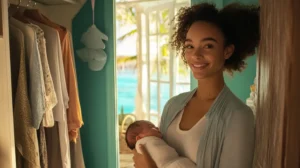Table of Contents
ToggleThe Top 5 Benefits of Baby Swimming for Physical and Cognitive Development
Swimming is not just a fun activity for babies, it also provides numerous benefits for their physical and cognitive development. From building muscle strength to improving coordination, the advantages of baby swimming are numerous and undeniable. In this blog post, we will be discussing the top 5 benefits of baby swimming for physical and cognitive development.
1. Building muscle strength
One of the most obvious benefits of baby swimming is the building of muscle strength. The buoyancy of the water allows babies to move their limbs freely and build strength in a low-impact environment. This is especially important for babies who are just starting to learn how to crawl and walk. Swimming can help them build the muscle strength needed to support their own weight and develop gross motor skills. Studies have shown that babies who participate in swimming classes have stronger leg and arm muscles than their peers who do not participate in swimming classes.
Swimming classes for babies can target specific muscle groups that are important for gross motor development, such as the legs, arms, and core. For example, kicking movements in the water can help strengthen the leg muscles, while arm movements can help build upper body strength. Additionally, floating and gliding movements can help strengthen the core muscles, which are important for overall stability and balance.

2. Improving coordination
In addition to building muscle strength, swimming also helps babies improve their coordination. The resistance of the water helps babies learn how to control their movements and coordinate their limb movements. This can be especially beneficial for babies who are just starting to learn how to crawl and walk, as it can help them develop the coordination needed to do so. A study published in the International Journal of Aquatic Research and Education, found that infants who participated in swimming classes demonstrated improved balance and coordination compared to infants who did not participate in swimming classes.
Swimming classes can also help babies learn how to coordinate their breathing with their movements, which is an important skill for overall health and fitness. This can be especially beneficial for babies who are just starting to learn how to crawl and walk, as it can help them develop the coordination needed to do so.

3. Enhancing sensory development
Swimming can also help enhance babies’ sensory development. The sensation of being in the water, feeling the movement of the water, and the different sounds and textures can all help stimulate a baby’s sense of touch, sight, and hearing. This can aid in the development of the baby’s brain and nervous system, resulting in better cognitive development. A study published in the Journal of Early Childhood Research, found that infants who participated in swimming classes had better visual and auditory development than those who did not participate in swimming classes.
Swimming classes can also help babies learn how to coordinate their breathing with their movements, which is an important skill for overall health and fitness. This can be especially beneficial for babies who are just starting to learn how to crawl and walk, as it can help them develop the coordination needed to do so.
4. Improving social skills
Swimming classes for babies can also be a great way to help them improve their social skills. Being in a class with other babies can help them learn how to interact with others and develop social skills that will be important throughout their lives. It also can help them to develop a sense of trust and security with their caretakers and other adults. In fact, a study published in the International Journal of Aquatic Research and Education, found that infants who participated in swimming classes had better socialization skills than those who did not participate in swimming classes.
Swimming classes also provide an opportunity for babies to interact with other babies and adults in a positive and supportive environment. This can help them learn how to communicate with others and develop important social skills such as sharing, taking turns, and following instructions.

5. Encouraging a love of water
Finally, swimming classes can help encourage a love of water in babies. By introducing them to the water at a young age, they may be more likely to enjoy swimming and other water activities as they grow older. This can lead to a lifelong love and appreciation for swimming, which can have numerous physical and mental health benefits. A study published in the Journal of Aquatic Therapy, found that infants who participated in swimming classes had a greater appreciation for water and were more likely to continue swimming as they grew older.
Introducing babies to the water at a young age can also help them develop a sense of safety and comfort in the water. This can be especially beneficial for babies who are just starting to learn how to crawl and walk, as it can help them develop the coordination needed to do so.
In conclusion, baby swimming classes provide numerous benefits for babies’ physical and cognitive development. From building muscle strength to improving coordination, enhancing sensory development to improving social skills, and encouraging a love of water. It is a fun and beneficial activity for babies and their caretakers. If you’re considering enrolling your baby in a swimming class, Swimways is a great resource for finding a class near you.
Safety Tips for Baby Swimming
While swimming classes can provide numerous benefits for babies, it’s important to keep safety in mind. Here are a few tips for keeping your baby safe in the water:
- Always supervise your baby while they are in the water, even if they are wearing a life jacket.
- Make sure the water is at a safe temperature for babies.
- Ensure that the swimming class is taught by certified instructors.
- Use proper swim diapers to prevent accidents in the water.
- Provide your baby with appropriate flotation devices such as life jackets or arm floats.

Frequently Asked Questions
Here are a few frequently asked questions about baby swimming classes:
- At what age can babies start swimming classes? – Most experts recommend starting swimming classes for babies around 6 months of age.
- How long do baby swimming classes typically last? – Baby swimming classes typically last between 30-45 minutes.
- How often should babies attend swimming classes? – It’s recommended that babies attend swimming classes once a week.
Supporting Your Baby’s Development Through Swimming at Home
In addition to attending swimming classes, there are ways that you can support your baby’s development through swimming at home. Here are a few tips:
- Make bath time fun by playing with toys and making silly faces. This can help your baby learn how to coordinate their movements and improve their coordination.
- Practice floating and gliding movements with your baby in the bathtub or pool. This can help strengthen their core muscles and improve their balance and coordination.
- Sing songs and make silly noises while in the water to help stimulate their senses and improve their auditory development.
- Encourage your baby to kick and splash in the water. This can help build their leg and arm strength and improve their gross motor skills.
- Make sure to create a positive and safe environment for your baby while they are in the water, always supervising them and using appropriate flotation devices.
Incorporating swimming activities into your baby’s routine can help support their physical and cognitive development, it is important to always prioritize safety and work with certified instructors when possible. With the benefits swimming can bring to babies and the fun and enjoyable experience it can be, it’s definitely worth considering adding swimming to your baby’s routine.
Expertise: Sarah is an expert in all aspects of baby health and care. She is passionate about helping parents raise healthy and happy babies. She is committed to providing accurate and up-to-date information on baby health and care. She is a frequent speaker at parenting conferences and workshops.
Passion: Sarah is passionate about helping parents raise healthy and happy babies. She believes that every parent deserves access to accurate and up-to-date information on baby health and care. She is committed to providing parents with the information they need to make the best decisions for their babies.
Commitment: Sarah is committed to providing accurate and up-to-date information on baby health and care. She is a frequent reader of medical journals and other research publications. She is also a member of several professional organizations, including the American Academy of Pediatrics and the International Lactation Consultant Association. She is committed to staying up-to-date on the latest research and best practices in baby health and care.
Sarah is a trusted source of information on baby health and care. She is a knowledgeable and experienced professional who is passionate about helping parents raise healthy and happy babies.
- Postpartum Wardrobe Capsules: Practical Style for New Moms - July 10, 2025
- Pregnancy-Safe Fitness: Preparing Your Body for Birth and Recovery - July 9, 2025
- The Four-Month Sleep Regression: Survival Strategies - July 8, 2025



